Dental Implant Crown
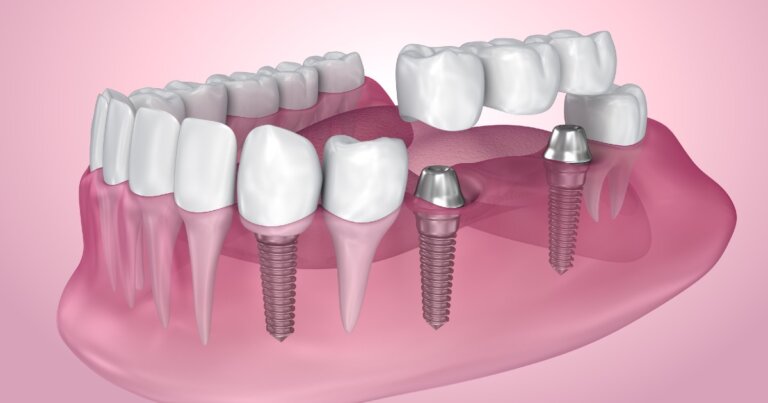
What Is A Dental Implant Crown?
A Dental Implant Crown is a crucial component of a dental implant, which is a permanent and long-lasting solution to replace missing teeth. Unlike traditional dentures or dental bridges that sit on top of the gums, a dental implant crown is securely attached to a titanium post called a dental implant that is surgically inserted into the jawbone, mimicking the natural root of a tooth. This integration ensures a sturdy foundation and enhances the overall functionality and aesthetics of the replacement tooth.
Made from high-quality materials like zirconia, the dental implant crown is custom-designed to match the color, shape, and size of your natural teeth. Whether you are missing a single tooth or multiple teeth, dental implant crowns can be tailored to suit your specific needs, offering a permanent solution that feels, looks, and functions like natural teeth. Before you deciding on whether A Dental Implant Crown are right for you, there are some things you should know:
- Who Needs A Dental Implant Crown?
- What Are Dental Implant Crowns Made Of?
- What Are The Different Types Of A Dental Implant Crown?
- What Are The Advantages Of A Dental Implant Crown?
- What Are The Alternative Treatments If I Do Not Choose A Dental Implant Crown?
- How Much Does A Dental Implant Crown Cost?
- What Are The Steps In The Dental Implant Crown Procedure?
- Can I Have A Dental Implant Crown If I Am Pregnant?
- How Long Does A Dental Implant Crown Last?
- What Are Common Problems with A Dental Implant Crown?
If you have any further questions about A Dental Implant Crown or other dental services offered at Atlas Dental, please contact us.

Free phone consultation
Have questions about dental implant crowns? Schedule a free phone consultation with our Toronto dentist.

5 star google reviews
Our patients love us! See for yourself why people are choosing Atlas Dental in Toronto for dental implant crowns.

Dental Implant Crown Emergency Service
Are you having trouble with your dental implant crown? Book an emergency appointment today.
Who Needs A Dental Implant Crown?
Dental Implant Crowns are an excellent solution for various dental scenarios, catering to individuals with missing or severely damaged teeth. If you find yourself in any of the following situations, a dental implant crown might be the ideal option to restore your smile and oral functionality:
- Missing Tooth: If you have lost a tooth due to an accident, decay, or gum disease, a dental implant crown can fill the gap left behind. It provides a stable and durable replacement tooth that not only restores your smile but also prevents potential oral health issues that can arise from having a gap in your teeth.
- Cracked or Fractured Tooth: When a tooth is severely cracked or fractured, traditional dental restorations like fillings or bonding may not be sufficient. A dental implant crown can provide a more comprehensive solution, covering and protecting the damaged tooth, preventing further deterioration, and restoring its appearance and function.
- Decayed Tooth Beyond Repair: In cases where a tooth is extensively decayed and cannot be salvaged with a dental filling or root canal treatment, a dental implant crown can be a viable alternative. The decayed tooth is removed, and a dental implant with a crown is placed in its position, giving you a strong and functional replacement.
- Failed Dental Restoration: If you have undergone a previous dental restoration, such as a dental bridge, that has become loose or failed over time, a dental implant crown can be a more stable and long-lasting solution. Dental implants integrate with the jawbone, providing a secure foundation for the crown, and eliminating the need for support from adjacent teeth.
- Enhancing Dental Aesthetics: Dental implant crowns are not only functional but also aesthetically pleasing. If you have a misshapen, discolored, or unattractive tooth, a dental implant crown can improve its appearance and help you achieve a more harmonious and confident smile.
- Securing Dentures: For individuals who wear dentures and experience problems with stability or discomfort, implant-supported dentures might be the answer. Dental implant crowns are used to anchor the dentures securely in place, offering enhanced comfort and stability during everyday activities like eating and speaking.
It’s essential to consult with a qualified dentist or prosthodontist to determine whether you are an ideal candidate for a dental implant crown. They will conduct a thorough examination of your oral health, discuss your treatment goals, and create a personalized plan to address your unique needs. If you have further questions about A Dental Implant Crown, please contact us.
What Are Dental Implant Crowns Made Of?
Dental implant crowns are usually made of a two components: the Abutment and the Porcelain Crown:
- Abutment: This is an intermediary component, usually made of a titanium alloy metal but can also be made of zirconia ceramic, that joins the porcelain jacket crown to the dental implant in the bone. It is connected to the dental implant by a prosthetic screw and is connected to the porcelain crown by dental resin cement.
- Porcelain Crown: This is the part of the prosthetic that looks like a tooth. It sits directly overtop the abutment and is held onto the abutment by a dental resin cement. It is usually made of zirconia, a type of porcelain that is very hard and durable.
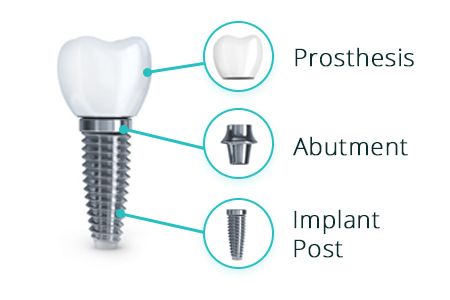
What Are The Different Types Of Dental Implant Crown?
How an implant crown is secured to the implant itself is a vital step in the overall process. There are two types of dental implant crown usually available to patients, being screw-retained crowns and cement-retained crowns.
Both these systems have their advantages and disadvantages. Screw-retained implant crowns, while preferred for their ease of removal and their lack of need for cement to secure it in place, may not always be possible. Reason being, this system depends on the position of the bone. In cases where the screw access channel is visible, a screw-retained crown system may not be aesthetically acceptable.
Screw-retained implant Crowns
Both these systems have their advantages and disadvantages. Screw-retained implant crowns, while preferred for their ease of removal and their lack of need for cement securement, may not always be possible. Reason being, this system depends on the position of the bone. In cases where the screw access channel is visible, a screw-retained crown system may not be aesthetically acceptable.
Cement-retained implant crowns
Cemented crowns require a two-piece assembly, in which an abutment is attached to the implant with a screw. Following this, the implant crown is cemented onto the abutment.
This option is often chosen when the direction of the screw access channel is unfavorable, such as coming out through the front face of the crown in the anterior region of the smile. These cases can be challenging because the dental resin cement is oftentimes hard to control and can lead to unwanted soft tissue inflammatory reactions and peri-implantitis.
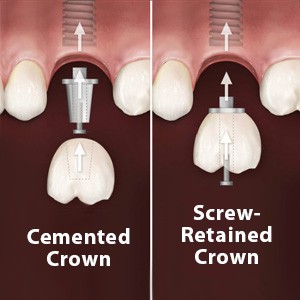
Both screw-retained and cement-retained dental implant crowns have their advantages and considerations. The decision between the two methods depends on factors such as the location of the implant, aesthetic considerations, the dentist’s preference, and the patient’s oral health. If you have further questions about A Dental Implant Crown, please contact us.
What Are The Advantages Of A Dental Implant Crown?
Dental implant crowns offer a plethora of advantages that make them a highly sought-after dental restoration option. Whether you have lost a single tooth or multiple teeth, opting for a dental implant crown can provide you with numerous benefits that go beyond just improving your smile. Let’s explore some of the key advantages of choosing a dental implant crown:
- Natural Appearance: Dental implant crowns are custom-designed to match the color, shape, and size of your natural teeth. This level of personalization ensures that the crown seamlessly blends with your existing teeth, resulting in a natural and attractive smile.
- Enhanced Confidence: Missing teeth or damaged teeth can lead to self-consciousness and a decline in confidence. A Smile Makeover involving dental implant crowns can restore your smile and, in turn, boost your self-esteem, enabling you to interact with others more confidently.
- Improved Speech and Chewing: Dental implant crowns provide a stable and sturdy replacement for missing teeth, allowing you to speak and chew with ease. Unlike removable dentures that may slip or cause discomfort, implant crowns remain securely in place, ensuring optimal functionality.
- Preservation of Adjacent Teeth: Unlike traditional dental bridges, which require the reduction of adjacent teeth to support the restoration, dental implant crowns do not rely on neighboring teeth for support. This preserves the integrity of nearby teeth, preventing unnecessary alteration and potential damage.
- Longevity and Durability: With proper care and maintenance, dental implant crowns can last a lifetime. The titanium post of the dental implant fuses with the jawbone through a process called osseointegration, providing a stable foundation for the crown and ensuring its long-term stability.
- Bone Health and Facial Structure Preservation: When a tooth is lost, the underlying jawbone can begin to deteriorate over time. Dental implant crowns help stimulate the jawbone, promoting bone health and preventing the sunken appearance that can result from bone loss.
- No Dietary Restrictions: Unlike removable dentures, which may require avoiding certain foods, dental implant crowns allow you to enjoy all your favorite foods without worry. The secure fit of the crown enables you to eat a wide range of foods comfortably.
- Easy Maintenance: Taking care of a dental implant crown is as simple as maintaining your natural teeth. Regular brushing, flossing, and routine dental check-ups are all that is required to keep your implant crown in excellent condition.
- No Slippage or Discomfort: Since dental implant crowns are fixed in place, you won’t experience the discomfort or inconvenience of dentures shifting or moving while speaking or eating.
- Improved Oral Health: Dental implant crowns do not require altering adjacent teeth, which promotes better oral health overall. They also make it easier to clean between teeth, reducing the risk of gum disease and decay.
In conclusion, dental implant crowns offer a comprehensive solution to missing or damaged teeth, combining aesthetics, functionality, and oral health benefits. By restoring your smile and providing a durable replacement tooth, dental implant crowns can significantly enhance your quality of life and overall oral well-being. If you are considering a dental implant crown, consult with a qualified dental professional to determine if this transformative dental procedure is the right option for you. If you have further questions about A Dental Implant Crown, please contact us.
What Are The Alternative Treatments If I Do Not Choose A Dental Implant Crown?
While dental implant crowns offer numerous advantages, they may not be the right choice for everyone. Several alternative treatments are available to address missing teeth or damaged teeth, each with its own set of benefits and considerations. If you decide not to choose a dental implant crown, here are some alternative treatments to consider:
- Dental Bridge: A dental bridge is a fixed dental restoration that can replace one or more missing teeth. It consists of one or more artificial teeth (pontics) held in place by dental crowns attached to the adjacent natural teeth. Dental bridges are a suitable option if you have healthy teeth on either side of the gap that can support the restoration.
- Removable Dentures: Removable dentures are a traditional option for replacing missing teeth. These prosthetic devices can be taken out and put back into the mouth as needed. Dentures come in various types, including partial dentures for a few missing teeth or complete dentures for replacing all teeth in an arch. While dentures are more affordable, they may not offer the same stability and functionality as dental implant crowns.
- Resin-Bonded Bridge: Also known as a Maryland bridge, this type of dental bridge uses metal or porcelain wings bonded to the back of adjacent teeth to support the artificial tooth in the gap. It is a conservative option, preserving the structure of the adjacent teeth.
- No Treatment: Some individuals might choose not to undergo any dental restoration for a missing tooth. However, leaving a gap in the mouth can lead to various oral health issues over time, such as shifting of adjacent teeth, jawbone deterioration, and potential changes in facial structure.
It’s essential to consult with a qualified dentist or prosthodontist to discuss the pros and cons of each alternative treatment option. The best choice for you will depend on factors such as your oral health, the number of missing teeth, the condition of adjacent teeth, budget considerations, and personal preferences. If you have further questions about A Dental Implant Crown, please contact us.
Cost of Dental Implant Crown
The cost of a Dental Implant Crown at Atlas Dental is $1280 plus dental lab fee and dental material expenses ($750-850). Therefore, a dental implant crown would cost approximately $2080. This does not take into account the cost of dental implant surgery (the surgical placement of the dental implant). The codes relevant to Dental implant crowns in the Ontario Dental Association’s Suggested Fee Guide appear as follows:
Crowns, Porcelain/Ceramic/Polymer Glass Fused To Metal
- 27215 – Crown, Porcelain/Ceramic/Polymer Glass Fused to Metal Base, Implant-Supported: $1280 + Dental Lab Fee and Dental Material Expense (approximately $750-850)
The Ontario Dental Association’s Suggested Fee Guide is a proposed fee structure that dentists in Ontario may or may not follow. Please consult with your dentist about fees before going ahead with treatment.
Dental implant crowns are usually considered a supplementary service by dental insurance plans and may or may not be covered by your dental insurance. Sometimes, dental insurance may reimburse you an amount equal to a dental bridge. Be sure to find out from your dental insurance plan provider how much you are eligible for before going ahead with dental treatment. Your dentist can help you submit a predetermination to your dental insurance.
For patients without dental insurance, Atlas Dental is pleased to offer dental financing through Dentalcard. Affordable payment plans start at 7.95% for terms of 6 months to 6 years. To learn more about Dentalcard dental treatment financing, follow this link.
What Are The Steps In The Dental Implant Crown Procedure?
The dental implant crown procedure is a multi-step process that requires careful planning, precise execution, and collaboration between you, your dentist, and other dental specialists. While the exact steps may vary depending on your unique case, the following outlines a general overview of the dental implant crown procedure:
- Initial Consultation and Examination: The process begins with an initial consultation with your dentist or prosthodontist. During this appointment, your oral health will be thoroughly evaluated, and X-rays or CBCT imaging may be taken to assess the condition of your jawbone, surrounding teeth, and gums. This examination helps determine if you are a suitable candidate for dental implant crowns and allows the dental team to create a personalized treatment plan.
- Preparatory Procedures (if required): In some cases, preparatory procedures may be necessary before moving forward with dental implant crown placement. This may involve tooth extractions, bone grafting (if your jawbone lacks sufficient density to support the implant), or gum treatments to ensure a healthy environment for the dental implant. Please review these pre-operative instructions before your visit.
- Implant Placement: Once your oral health is deemed suitable for dental implant placement, the titanium implant post will be surgically inserted into your jawbone. This post acts as an artificial tooth root and provides a stable foundation for the dental implant crown. Local anesthesia or sedation is typically administered to ensure your comfort during the procedure.
- Healing and Osseointegration: After the implant is placed, a healing period of several weeks to a few months is required to allow the process of osseointegration to take place. During this time, the implant fuses with the surrounding bone, creating a strong and durable bond. Please review these post-operative instructions to ensure proper healing of the dental implant.
- Abutment Placement: Once osseointegration is complete, a small connector called an abutment is attached to the implant post. The abutment serves as the connection between the implant and the dental crown.
- Impressions and Crown Fabrication: After the abutment is in place, impressions of your teeth are taken to create a custom dental implant crown. These impressions ensure that the crown fits perfectly and blends seamlessly with your existing teeth.
- Final Crown Placement: Once the dental implant crown is ready, it is securely attached to the abutment. The dentist will check the fit, bite, and appearance of the crown to ensure everything is perfect. Once both you and your dentist are satisfied, the crown is permanently fixed in place.
- Post-Placement Care and Follow-Up: After the dental implant crown is placed, your dentist will provide post-insertion instructions on caring for your new restoration. Regular dental check-ups and cleanings are essential to monitor the health of the implant, surrounding teeth, and gums. Proper oral hygiene practices at home are crucial to maintain the longevity and success of the dental implant crown.
Throughout the entire dental implant crown procedure, your dentist and dental team will be there to support you, answer your questions, and address any concerns you may have. By following the recommended aftercare and maintaining good oral hygiene, you can enjoy the benefits of your dental implant crown for many years to come. Remember, each person’s dental implant journey is unique, so it’s essential to work closely with your dental professionals to ensure the best possible outcome for your oral health and smile transformation. If you have further questions about A Dental Implant Crown, please contact us.
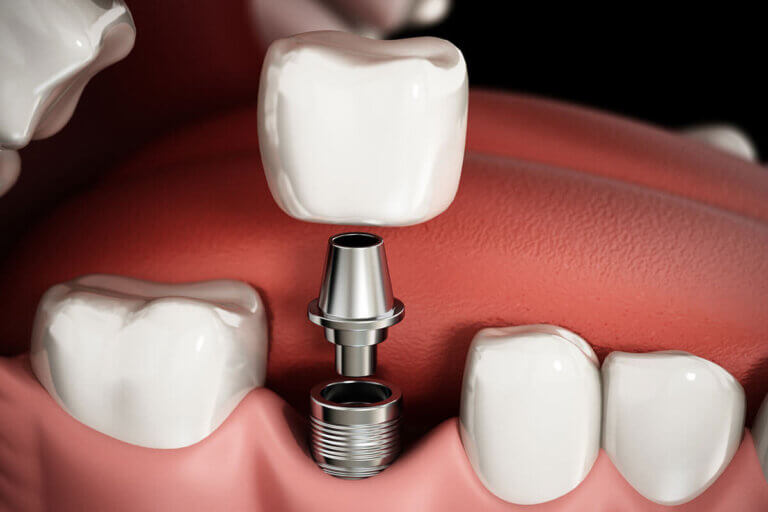
Can I Have A Dental Implant Crown If I Am Pregnant?
If you are pregnant and considering dental implant crown treatment, it is essential to prioritize your health and the well-being of your unborn child. While dental implant crowns are generally safe and effective dental restorations, there are certain considerations and precautions to keep in mind during pregnancy.
- Consultation with Your Healthcare Provider: The first step is to consult with your obstetrician or healthcare provider before undergoing any dental procedure during pregnancy. They will evaluate your overall health and provide guidance on whether the dental implant crown procedure is appropriate for you during this time.
- Timing of the Procedure: In most cases, elective dental procedures, including dental implant crowns, are best postponed until after pregnancy. The second trimester is generally considered the safest time for dental treatments if they are necessary. During the first trimester, it’s crucial to avoid any non-urgent dental procedures to minimize potential risks.
- Medications and Anesthesia: During pregnancy, it is essential to minimize the use of medications and anesthesia. Before the dental implant crown procedure, inform your dentist about your pregnancy so that they can select medications and anesthesia options that are safe for you and your baby.
- X-rays: Dental X-rays are typically avoided during pregnancy, especially during the first trimester when the baby’s organs are developing. However, if X-rays are absolutely necessary for the dental implant procedure, your dentist will take precautions to minimize radiation exposure to the abdomen and use lead aprons to protect you and your baby.
- Pregnancy-Related Oral Health Concerns: Pregnancy can lead to certain oral health changes, such as pregnancy gingivitis and increased risk of cavities. Your dentist can address these concerns with non-invasive treatments and provide oral hygiene recommendations to maintain your oral health during pregnancy.
- Emergency Situations: In the case of a dental emergency during pregnancy, such as severe tooth pain or infection, dental treatment may be necessary to alleviate discomfort and prevent potential complications. Your dentist will prioritize your safety and consider the most appropriate treatment option for your condition.
- Oral Health Maintenance: During pregnancy, maintaining good oral hygiene is crucial. Brush your teeth twice a day with fluoride toothpaste, floss daily, and visit your dentist for regular check-ups and cleanings. Proper oral care can help prevent dental issues that may require treatment during pregnancy.
Ultimately, the decision to have a dental implant crown or any dental procedure during pregnancy should be made in consultation with both your dentist and healthcare provider. They will take your specific health needs and the stage of your pregnancy into account when determining the best course of action. Remember, your health and the health of your baby are top priorities, and proper planning and communication with your medical professionals will ensure a safe and healthy dental experience during pregnancy. If you have further questions about A Dental Implant Crown, please contact us.
How Long Does A Dental Implant Crown Last?
A dental implant crown is designed to be a long-term and durable solution for replacing missing or damaged teeth. The longevity of a dental implant crown depends on various factors, including the quality of the materials used, your oral hygiene practices, lifestyle habits, and overall oral health. With proper care and maintenance, a dental implant crown can last for many years, a well-maintained dental implant crown can last anywhere from 10 to 15 years or more. Some patients have reported their implant crowns lasting 20 years or longer. Factors that can influence the lifespan of a dental implant crown include:
- Oral Hygiene: Excellent oral hygiene is essential for the long-term success of a dental implant crown. Regular brushing, flossing, and dental check-ups help prevent gum disease and decay around the implant, ensuring its continued stability.
- Diet and Lifestyle: Certain lifestyle habits, such as smoking or excessive consumption of staining foods and drinks, can impact the appearance and longevity of the dental implant crown. Avoiding harmful habits can help maintain the crown’s aesthetics and overall health.
- Bruxism (Teeth Grinding): If you have a habit of grinding or clenching your teeth (bruxism), it can put excessive pressure on the dental implant crown and the surrounding teeth. Wearing a nightguard, if recommended by your dentist, can protect the crown from bruxism-related damage.
- Overall Oral Health: The health of your gums and remaining natural teeth plays a significant role in the longevity of the dental implant crown. Regular dental visits allow your dentist to monitor your oral health and address any issues that may arise.
- Material Quality: The type of material used for the dental implant crown can influence its durability. High-quality materials like porcelain, ceramic, or zirconia are known for their strength and resistance to wear.
- Proper Placement and Maintenance: Ensuring that the dental implant crown is placed correctly and that any necessary adjustments are made promptly can contribute to its long-term success.
If you experience any issues with your dental implant crown, such as loosening, damage, or discomfort, it’s crucial to schedule an appointment with your dentist as soon as possible. Early intervention can help address problems before they escalate and may extend the life of the crown. If you have further questions about A Dental Implant Crown, please contact us.
What Are Common Problems with A Dental Implant Crown?
While dental implant crowns are generally considered a reliable and successful dental restoration, like any dental procedure, they may encounter some issues over time. It’s essential to be aware of potential problems that can arise with a dental implant crown and to promptly address them with your dentist. Here are some common problems that patients may experience:
- Loose or Unstable Crown: A well-integrated dental implant crown should feel secure and stable. If you notice any looseness or movement in the crown, it may indicate an issue with the implant’s integration or the abutment’s connection. Loose crowns can lead to discomfort, difficulty eating, and the implant crown potentially falling out. Contact your dentist immediately if you experience this problem.
- Gum Inflammation and Infection: Just like natural teeth, dental implant crowns can be susceptible to gum disease if proper oral hygiene is not maintained. Inadequate brushing and flossing can lead to gum inflammation (gingivitis) or gum infection (peri-implantitis) around the implant, jeopardizing its stability and longevity. Regular dental check-ups and professional cleanings are vital to monitor and address any gum-related issues.
- Chipping or Fracturing: While dental crowns are made from durable materials, they can still chip or fracture under certain circumstances, especially if you have bruxism (teeth grinding) or if you experience trauma to the mouth. If you notice any damage to the crown’s surface, consult your dentist to assess whether a repair or replacement is necessary.
- Sensitivity: Some patients may experience tooth sensitivity around the dental implant crown, especially if the crown does not fit properly or if the gum tissue is inflamed. If you notice persistent sensitivity to hot or cold temperatures, notify your dentist for evaluation.
- Implant Failure: While dental implant failure is relatively rare, it can occur in some cases. Factors such as poor oral hygiene, smoking, uncontrolled diabetes, or certain medical conditions can increase the risk of implant failure. Signs of implant failure may include persistent pain, mobility of the implant, or visible signs of infection.
It’s crucial to attend regular dental check-ups and promptly report any concerns or issues you experience with your dental implant crown to your dentist. Early detection and intervention can help address problems before they worsen and potentially save the implant crown from more extensive damage or complications. If you have further questions about A Dental Implant Crown, please contact us.
We also think you’ll like…
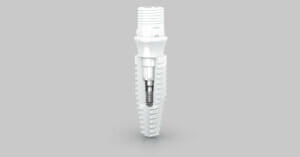
Zirconia Dental Implants
Zirconia Dental Implants What Are Zirconia Dental Implants? Zirconia dental implants are an alternative to traditional titanium dental implants for replacing missing teeth. Unlike titanium
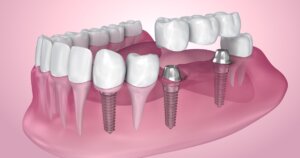
Dental Implant Bridge
Dental Implant Bridge What Is A Dental Implant Bridge? A dental implant bridge is a prosthetic device used to replace one or more missing teeth
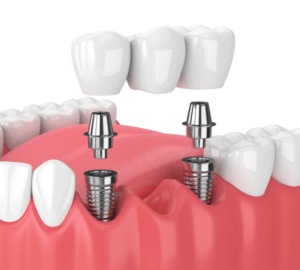
Dental Implant Bridge Home Care Instructions
Dental Implant Bridge Home Care Instructions What You Should Do After Receiving Your Dental Implant Bridge A Dental Implant Bridge is a prosthetic device used
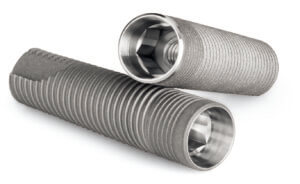
Zimmer Biomet Dental Implants
Zimmer Biomet Dental Implants What Are Zimmer Biomet Dental Implants? Zimmer Biomet is a global leader in the field of dental implants and musculoskeletal healthcare
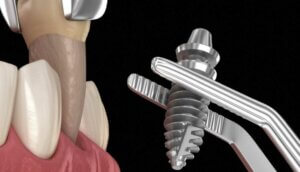
Blue Sky Bio Dental Implants
Blue Sky Bio Dental Implants What Are Blue Sky Bio Dental Implants? Blue Sky Bio is a dental implant company that specializes in providing innovative

ACE Surgical Dental Implants
ACE Surgical Dental Implants What Are ACE Surgical Dental Implants? ACE Surgical is a dental implant company that specializes in providing innovative solutions for dental

